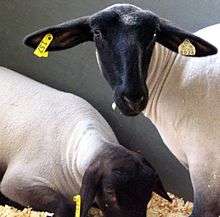Suffolk sheep
Suffolk sheep are a black-faced, open-faced breed of domestic sheep raised primarily for meat.
Ewes
They are mainly raised for wool and meat production especially when crossed with the progeny of a Welsh Mountain ewe. For example, a purebred upland ewe such as a Welsh Mountain ewe, might be bred with a breeding sire Bluefaced Leicester ram. This is a Welsh Mule, one of many different types of half-bred ewes. The lamb produced when a half-bred ewe is crossed with a Suffolk ram (as well as with other terminal sire breeds such as Texel, Beltex or Charollais) is considered ideal for meat production, since they have unusually good conformation. The lamb has the easy-care benefits of a mountain ewe, as well as the excellent growth of the Suffolk ram. The Suffolk breed is also more resistant to elf fire, a disease brought on by eating, among others, the bog asphodel. Sunlight worsens the condition, but the black head and ears of the Suffolk limit sunlight down to the otherwise exposed skin.
Suffolk sheep are also shown in youth and adult shows. Organizations such as the FFA and 4-H allow middle school and high school students to learn responsibility by showing market lambs and breeding ewes. The sheep may be pure breed or commercial (cross-breed).[1]
Origin

Suffolks were originally developed in England as the result of crossing Southdown rams on Norfolk Horned ewes. The product of this cross was an improvement over both parent breeds.
Characteristics
They are a large breed of sheep. Mature weights for rams range from 250 to 350 lb (110 to 160 kg), ewe weights vary from 180 to 350 lb (80 to 160 kg). Fleece weights from mature ewes are between 5 and 8 lb (2.3 and 3.6 kg), with a yield of 50% to 62%. The fleeces are considered medium wool in type, with a fiber diameter of 25.5 to 33 microns[2] and a spinning count of 48 to 58. They have black faces and legs, a large frame, and are highly muscular. The staple length of ranges from 2.0 to 3.5 in (51 to 89 mm).[3]
Spider lamb syndrome is most common in the Suffolk breed.[4]
References
- ↑ Mitchell, G. B. B. (1988). "Non-parasitic skin diseases of sheep". In Practice. 10 (2): 69. doi:10.1136/inpract.10.2.69.
- ↑ Preparation of Australian Wool Clips, Code of Practice 2010-2012, Australian Wool Exchange (AWEX), 2010
- ↑ "Suffolk". Breeds of Livestock. Oklahoma State University, Dept. of Animal Science. Retrieved 2009-03-30.
- ↑ Congenital and Inherited Anomalies of the Musculoskeletal System in Sheep: Spider lamb syndrome, at the Merck Veterinary Manual; published December 2013; retrieved December 28, 2013
External links
| Wikimedia Commons has media related to Suffolk sheep. |
- United Suffolk Sheep Association
- English website about Suffolk Sheep
- English website about Suffolk Sheep